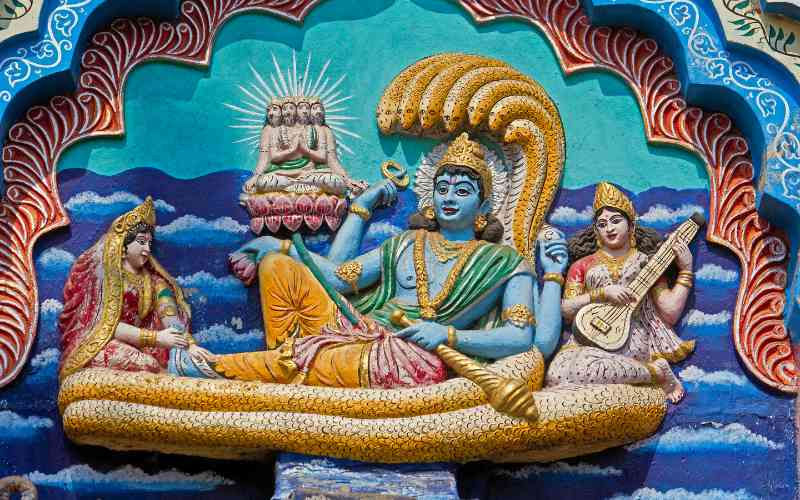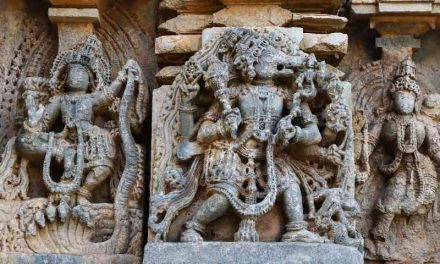The Vishnu Purana is one of the eighteen Mahapuranas in Hinduism and is believed to be composed between the 3rd and 5th century CE. It is considered a sacred text and contains valuable teachings on dharma, karma, and moksha. These teachings are relevant even today and provide guidance on leading a fulfilling and purposeful life.
The text also emphasizes the importance of the intention behind our actions. It states that the intention behind our actions is as important as the action itself. If the intention is pure and selfless, the karma will be positive, and if it is selfish and harmful, the karma will be negative. The Vishnu Purana also teaches that one should not perform actions for the sake of reward but should act selflessly without expecting anything in return.
Vishnu Purana is one of the oldest and most revered Puranas in Hinduism. It is a collection of stories, legends, and teachings that glorify Vishnu, the supreme lord of the universe. Among the many topics that Vishnu Purana covers, three are of utmost importance for spiritual seekers: dharma, karma, and moksha.
Dharma is the moral law that governs the conduct of all living beings. It is derived from the eternal nature of Vishnu, who is the source of all order and harmony in the cosmos. Dharma is not a rigid set of rules, but a dynamic principle that adapts to the changing circumstances and needs of different times and places. Dharma is also the duty that one has to perform according to one’s varna (social class) and ashrama (stage of life). By following dharma, one can attain peace, happiness, and prosperity in this world.
Karma is the law of cause and effect that operates in the realm of action. It is based on the principle that every action has a corresponding reaction, either in this life or in the next. Karma is not a fate that binds one to a predetermined destiny, but a choice that one makes with free will. Karma is also the accumulation of merits and demerits that one earns through one’s actions. By understanding karma, one can avoid suffering and attain happiness in this world.
Moksha is the ultimate goal of human life. It is the liberation from the cycle of birth and death that is caused by ignorance and attachment. It is the realization of one’s true nature as the eternal soul (atman) that is identical to Vishnu (brahman), the supreme reality. Moksha is not a state that one can achieve by external means, but a state that one can discover within oneself by grace and devotion. By attaining moksha, one can transcend suffering and attain bliss in this world and beyond.
Vishnu Purana teaches that dharma, karma, and moksha are interrelated and interdependent. One cannot attain moksha without following dharma and understanding karma. One cannot follow dharma without being aware of karma and aspiring for moksha. One cannot understand karma without practicing dharma and seeking moksha. Vishnu Purana also teaches that the best way to follow dharma, understand karma, and attain moksha is to worship Vishnu with love and devotion. By doing so, one can receive his grace and guidance, and ultimately merge with him in eternal bliss.
Dharma is a central concept in Hinduism, and the Vishnu Purana emphasizes its importance. According to the text, dharma is the foundation of the universe and the basis for all ethical and moral principles. It is the natural law that governs all things and upholds the order of the cosmos. The text also highlights that dharma is not static but dynamic and evolves with time and changing circumstances.
The Vishnu Purana teaches that dharma has four essential components: truthfulness, compassion, austerity, and purity. Truthfulness means being honest in all dealings, while compassion involves showing kindness and empathy to all living beings. Austerity is the practice of self-discipline and self-control, while purity means keeping oneself free from all negative thoughts and actions.
Karma is another important concept in Hinduism, and the Vishnu Purana explains its workings in detail. According to the text, karma refers to the law of cause and effect. Every action we take, whether good or bad, will have consequences that we will have to face in this life or the next. Therefore, it is essential to perform good deeds and avoid bad ones to ensure a positive outcome..
References:
(1) Vishnu Purana in English – Mahakavya – Read Ved Puran Online. https://www.mahakavya.com/vishnu-puran-english/
(2) The Vishnu Purana – Wisdom Lib. https://www.wisdomlib.org/hinduism/book/vishnu-purana-wilson
(3) Vishnu Purana – Hindu Online. http://hinduonline.co/Scriptures/Puranas/VishnuPurana.html





